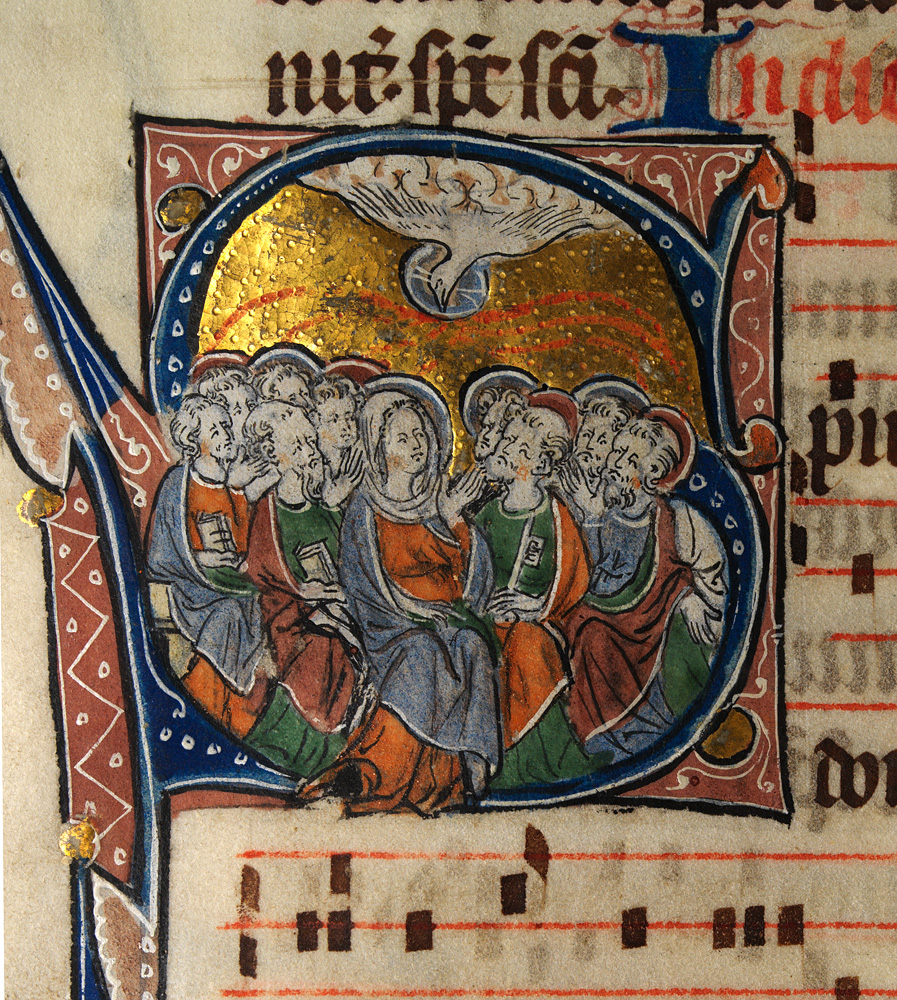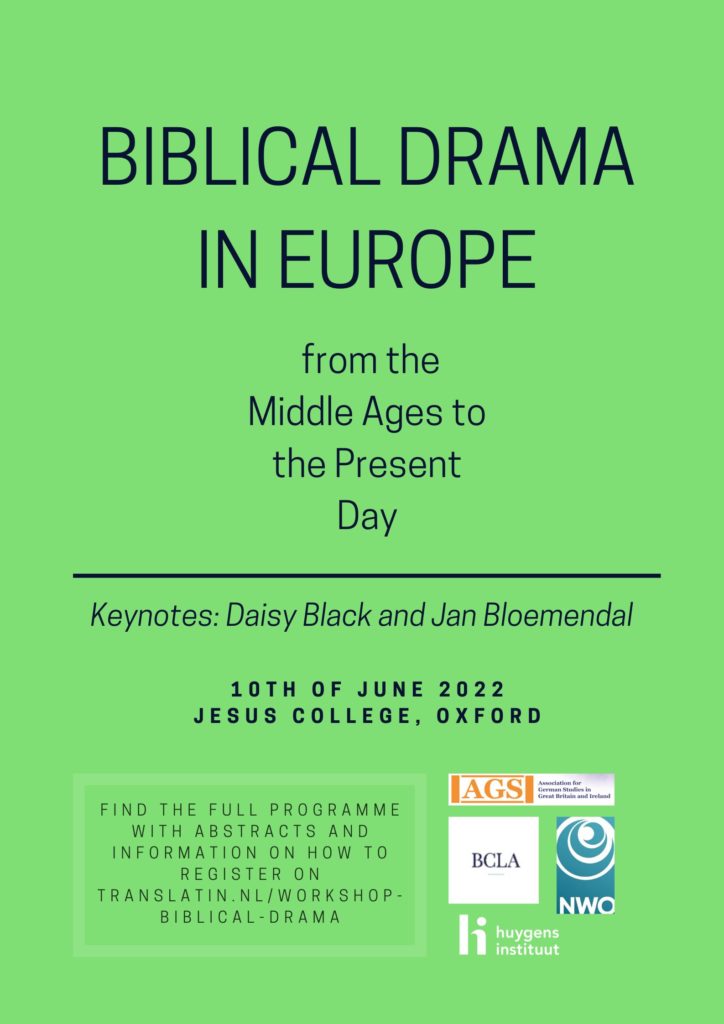‘In our own tongues’: The Medieval Vernacular Bible and its European Contexts’ is organised jointly by the Oxford and Augsburg research teams of the ‘Medieval Vernacular Bibles as Unity, Diversity and Conflict’. The project is based at the universities of Oxford and Augsburg and is supported by the UK-German Funding Initiative in the Humanities (Arts and Humanities Research Council and Deutsche Forschungsgemeinschaft) and the Bavarian Academy.
As part of the conference, we will be hosting the following session on Wednesday 1st October 2025:
3pm-5pm Bodleian Library, Lecture Theatre
Chair: Andrew Dunning (University of Oxford)
Emily Davenport Guerry (University of Oxford), MS. Duke Humfrey c. 1: Illuminating the French New Testament and its readers, from Jean le Bon to Duke Humfrey https://digital.bodleian.ox.ac.uk/objects/d5298278-6c9f-4eeb-a5a7-b6a3afa10720/
Freimut Löser (University of Augsburg), MS. Laud Misc. 479: The Paradisus-collection https://digital.bodleian.ox.ac.uk/objects/3d773133-2ecd-4dcb-b330-6879de4250ec/
Henrike Lähnemann (University of Oxford), MSS. Bodl. 969-970: A Fifteenth-century German Bible https://digital.bodleian.ox.ac.uk/objects/c7d33325-585c-4b2c-9a8b-e5689b58f893/
Catherine Mary MacRobert (University of Oxford), MS e Mus. 184: The Vicissitudes of the Church Slavonic Psalter https://medieval.bodleian.ox.ac.uk/catalog/manuscript_9100
Cosima Gilhammer (University of Oxford), MS. Bodl. 243: Wycliffite Glossed Gospels https://digital.bodleian.ox.ac.uk/objects/49847fce-6618-481d-b7f5-2e31985995f4/
Elizabeth Solopova (University of Oxford), MS. Bodl. 441: Gospels in Old English https://digital.bodleian.ox.ac.uk/objects/759999c2-7a29-46a7-9182-734449e2b8c3/
The full conference programme is as follows:
30 September
9am-10.30am St Stephen’s House
Chair: Elizabeth Solopova (University of Oxford)
Elizabeth Solopova (University of Oxford), Welcome
Hannah Schühle-Lewis (University of Oxford), ‘Þe pope, maister of bischopps’: Translating an Episcopal Oath in 1380s England
Michael Kuczynski (Tulane University), Hebrew and Greek Words in the Wycliffite Bible
10.30am – Coffee
11am-12.30pm St Stephen’s House
Chair: Nadine Popst (University of Augsburg)
Domenic Peter (University of Augsburg), ‘Als Daniel gesprochen hat’: The Book of Daniel in the Work of the Austrian Bible Translator and Beyond
Stefanie Katzameyer (University of Augsburg), ‘Ungefüerte pfaffen’, ‘Stiffter alles kriegs vnd streytz’, ‘Discipuli Antichristi’: Criticism of the Clergy by the Austrian Bible Translator, Austrian Heretical Movements, and the Wycliffites
Angila Vetter (Hamburg University), Modelling Lay Authority in Digital Editions: When the Austrian Bible Translator Invokes Wolfram von Eschenbach
1-2pm Lunch at St Stephen’s House
Afternoon: Walk to the Norman church of St Mary, Iffley, with Henrike Lähnemann, followed by viewing of the Old Library, St Edmund Hall.
Evening: Buffet dinner, followed by Compline in the Norman Crypt of St-Peter-in-the-East (library church of St Edmund Hall).
1 October
9am-10.30am St Stephen’s House
Chair: Catherine Mary MacRobert (University of Oxford)
Kateřina Voleková (Charles University / Czech Language Institute), Old Czech Glosses on the Psalms in Latin Biblical Dictionaries
Andrea Svobodová (Czech Language Institute), Colophons in Late-medieval Bohemian Biblical Manuscripts
Katarzyna Jasińska-Różycka (Institute of Polish Language, Polish Academy of Sciences), Scriptural Echoes in the Prologues to Medieval Dictionaries: Motifs, Citations, and Inspiration
10.30am – Coffee
11am-12.30pm St Stephen’s House
Chair: Freimut Löser (University of Augsburg)
Vladimir Agrigoroaei ( CNRS / Centre for Medieval Studies, Poitiers), The Cultural Implications of God’s Preference for the French Speech in the Old Testament Poem Written by Évrat (Late–Twelfth Century)
Corentin Delattre (University of Poitiers / Centre for Medieval Studies, Poitiers), ‘To furnish the priests to maintain the law’: Structures and Contents of London, British Library, MS Arundel 230
Ágnes Korondi (Fragmenta et Codices Research Group of the Hungarian Research Network, National Széchényi Library), Converting the Gospel of Nicodemus into a Sermon: The Old Hungarian Adaptation of the Apocryphon and its Latin Homiletic Background
1-2pm Lunch at St Stephen’s House
3pm-5pm Bodleian Library, Lecture Theatre
Chair: Andrew Dunning (University of Oxford)
Emily Davenport Guerry (University of Oxford), MS. Duke Humfrey c. 1: Illuminating the French New Testament and its readers, from Jean le Bon to Duke Humfrey
Freimut Löser (University of Augsburg), MS. Laud Misc. 479: The Paradisus-collection
Henrike Lähnemann (University of Oxford), MSS. Bodl. 969-970: A Fifteenth-century German Bible
Catherine Mary MacRobert (University of Oxford), MS e Mus. 184: The Vicissitudes of the Church Slavonic Psalter
Cosima Gilhammer (University of Oxford), MS. Bodl. 243: Wycliffite Glossed Gospels
Elizabeth Solopova (University of Oxford), MS. Bodl. 441: Gospels in Old English
7pm Conference Dinner at St Stephen’s House
2 October
9am-10.30am St Stephen’s House
Chair: Vladimir Agrigoroaei (CNRS / Centre for Medieval Studies, Poitiers)
Ana-Maria Gînsac (Institute of Interdisciplinary Research, Alexandru Ioan Cuza University of Iași), The Practice of Alternative Translation in Two Seventeenth-century Romanian Psalters
Ileana Sasu (University of Tours), Translating Saint Audrey:Images, Motifs, and Cultural Adaptations Across Europe
Élisa Marcadet (University of Tours), From Latin to Middle English: Vernacular Adaptations of Psalm 135 in the Surtees Psalter
10.30am – Coffee
11am-12.30pm – St Stephen’s House
Chair: Ian Johnson (University of St Andrews)
Ondřej Fúsik (Charles University and National Library of the Czech Republic), Latin Gerunds and Gerundives and their Old English Translational Equivalents as Evidenced in Old English Biblical Translations
Audrey Southgate (University of Oxford), Wyclif on Scripture and Islam
Mishtooni Bose (University of Oxford), The Sword of Solomon: John Bury, Reginald Pecock and the Authority of Scripture
1-2pm Lunch at St Stephen’s House
Image credit: Pentecost, Sherbrooke missal, fol. 169v, c. 1320


